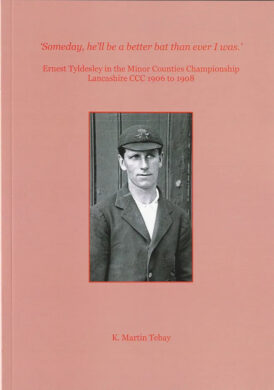‘Some day he’ll be a better bat than ever I was’
Martin Chandler |Published: 2024
Pages: 40
Author: Tebay, Martin
Publisher: Red Rose Books
Rating: 3.5 stars

Regular readers of Martin Tebay’s monographs will be surprised to learn that his latest publication deals with the life of a man who made his name as recently as a century ago. They can however feel reassured by the fact that this one does deal with a Lancastrian, and while his subject might have made his name in the 1920s, this monograph does look at events of the ‘Golden Age’.
The quote that gives the monograph its title comes from the mouth of a Tebay favourite, John Tommy Tyldesley, better known simply as JT, and one of the truly great English batsmen of the ‘Golden Age’. The subject of his fulsome praise is his younger, by 15 years, brother Ernest. Statistically Ernest’s record is much more impressive that that of his older sibling, but in truth it has never been suggested that Ernest was truly the better bat.
The comparisons are that Ernest scored 38,874 First Class runs at 45.46. He is the only Lancastrian, with 102, to score a century of centuries. On the other hand JT scored 37,897 runs at 40.66 with 86 hundreds. JT was capped more frequently, 31 times (26 against Australia) as against 14 (5 against Australia) for Ernest. In terms of the numbers however Ernest still leads, with an impressive average of 55.00 against JT’s seemingly modest 30.75. Batting conditions were, of course, rather easier in the 1920s than in JT’s time.
So what is the monograph about? It isn’t a biography, although the first four pages are taken up with a summary of Ernest’s life, and the last five contain his career statistics, in the main a list of those 102 centuries. I have found those lists fascinating ever since I first picked up a copy of Wisden Cricketers’ Almanack, and nothing has changed in the intervening half century or so.
And the main part of the narrative? I don’t want to be accused of playing spoiler, so will just point to the fact that Ernest did not score the sixth of those 102 centuries until after his thirtieth birthday, and that the monograph looks at a young Ernest’s ten appearances for Lancashire’s second eleven, between 1906 and 1908. ‘Some day he’ll be a better bat than ever I was’ is certainly an interesting read.






Leave a comment